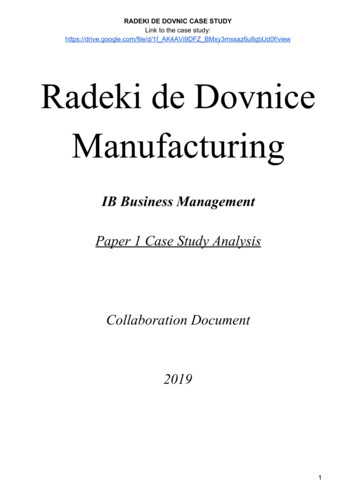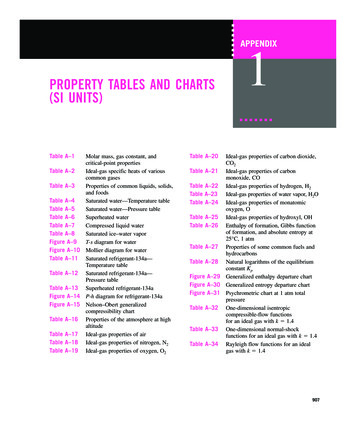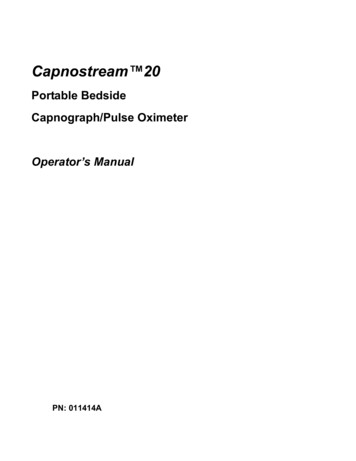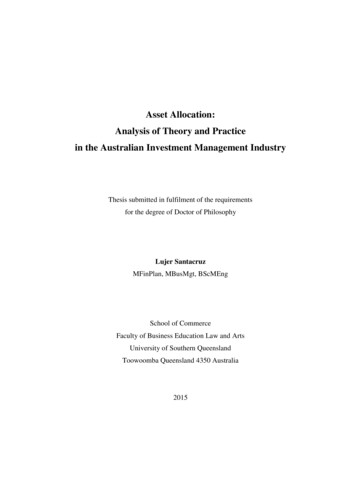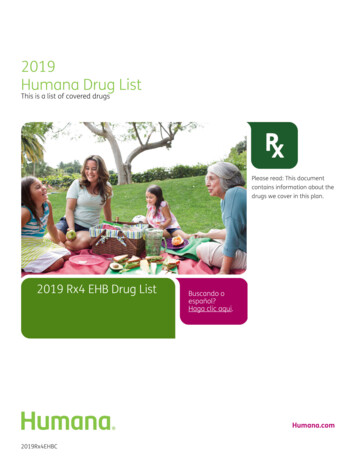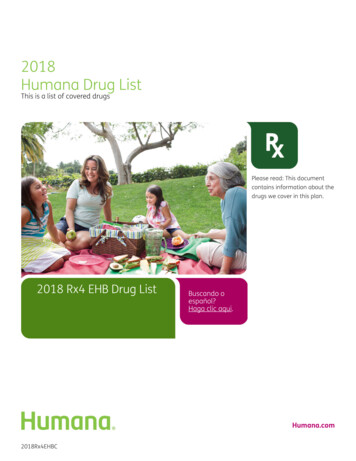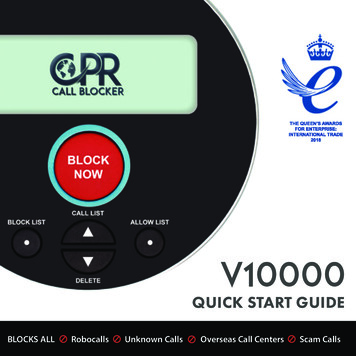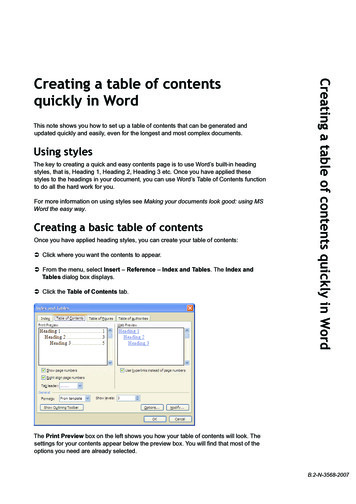
Transcription
Table of ContentsINTRODUCTION . 5Chapter 1 . 6Recruitment and Appointments . 6Chapter 2 . 11Job Opportunity Program . 11Chapter 3 . 13Position Classification . 13Chapter 4 . 14Performance Evaluation. 14Chapter 5 . 17Compensation . 17Chapter 6 . 21Workweek And Hours Of Duty . 21Chapter 7 . 24Leave Accruals And Ceilings . 24Chapter 8 . 34Incentive Awards Program & Training . 34Chapter 9 . 40Health Program . 40Chapter 10 . 42Death Benefits. 42Chapter 11 . 44Conduct, Conflict Of Interest And Disciplinary Action . 44Chapter 12 . 47Disciplinary Action . 47Chapter 13 . 58Grievance . 58Chapter 14 . 66Travel and transportation . 662 Page
Chapter 15 . 67Separations. 67Chapter 16 . 72Reduction In Force . 72Chapter 17 . 78Employee Association . 78Chapter 18 . 79Retirement Plans . 79Chapter 19 . 82Reemployment . 823 Page
APPENDIXESAppendix AAnnual (Lebaran) BonusAppendix BThe U.S. Leave PlanAppendix CStandard Operating Policy on Mission Employment HiringPracticesAppendix DTraining Policy and ProceduresAppendix EDrug Free PolicyAppendix FLeave PolicyAppendix GSexual Harassment PolicyAppendix HCompensatory Time Off For Official TravelAppendix ISeparation NoticeAppendix JFederal Employees Compensation ActAppendix KComputer Use ProhibitionsAppendix LAlternate Work Schedule (AWS)Appendix MMandatory EEO Awareness Training and Awards EligibilityAppendix NEthics4 Page
INTRODUCTIONThis is an update and expansion of the Locally Employed Staff (LES/FSN)Handbook last issued in January 2008. This edition includes policies governing LongTerm Sick Leave, Alternate Work Schedule (Appendix L), and Annual (Lebaran)Bonus (Appendix A). This handbook is specifically for Locally Employed Staff(LES/FSN) of the Embassy of the United States of America and U.S. ASEAN inIndonesia. It provides information about our personnel policies and regulations andis applicable to all Locally Employed Staff and all other Ordinarily Resident (OR)employees who are employed under a Direct Hire (DH), Personal Services Contract(PSC) or Personal Services Agreement (PSA) appointment by any of the U.S. agenciesin Indonesia, including the American Consulate General in Surabaya, AmericanConsulate in Medan and Consular Agency in Bali and paid under the Mission’s LocalCompensation Plan.As you read through this handbook, you may find that the conditions ofemployment and your benefits may differ from those offered by other employers andthe laws of Indonesia. Your employment is governed primarily by U.S. laws andregulations which may not always be the same as those in Indonesia. However, theU.S. Government voluntarily tries to comply with local laws, customs and practices ifthey do not contravene U.S. laws and regulations. In the event of any discrepancybetween (a) the Local Compensation Plan and FAM/FAH regulations and (b) this LEStaff Handbook, the Local Compensation Plan and FAM/FAH regulations willprevail.From time to time policies and regulations concerning your employment conditionsmay change. If this happens, you will be informed of any changes which may affectyour rights and obligations.If after reading the Handbook you have further questions, your Americansupervisor, the STATE Human Resources Officer will be pleased to discuss anymatter with you.5 Page
Chapter 1RECRUITMENT AND APPOINTMENTSA. DEFINITIONS OF EMPLOYEE STATUS1. Foreign Service National Employee (FSN) or locally employed (LE) staff of a U.S.Mission outside the United States. FSN employees are normally citizens of thecountry of employment.2. Personal Service Contract (PSC) is entered into by the U.S. Government with anindividual for performance of duties with a certain time limitation (one year withup to four option years. Incumbents can be reappointed).3. Personal Services Agreement (PSA) is another form of hiring mechanism used bySTATE and agencies that have signed Memoranda of Agreements (MOAs) withSTATE regarding overseas Personal Services Agreement Authority. Theagreement is for one year with up to nine optional years. Incumbents can bereappointed.B. RECRUITMENT POLICYIt is the policy of the U.S. Government and its overseas establishments to hire thebest qualified applicants available, without regard to race, color, religion, nationalorigin, age, marital status, or gender.1. The U.S. Mission has established uniform recruitment standards for positionsbased on the kinds and levels of expertise required for an effective operation.2. The Mission fills vacancies, whenever possible, by current Mission employees.Each vacancy will be advertised as a Vacancy Announcement, in the weekly Cicak,on the Embassy website for a minimum of two weeks and in identified localnewspaper(s) or jobsearch website if required. Current Mission employees (exceptprobationary employees) who wish to be considered, must apply in writing sent tothe Human Resources Officer.C. STANDARDS1. CitizenshipUnder the Rockefeller Amendment, U.S. citizens residing in Indonesia may beemployed in LE Staff positions. Resident Third Country Nationals (TCNs) may6 Page
also apply. They must have a work permit and will be paid local wages andbenefits.2. Qualification RequirementAll applications are verified to review that the candidates possess the educationalqualifications, training and experience to successfully perform the duties of theposition. Applicants for positions requiring special skills; i.e. computers,language, specific trade skills, driving, etc., maybe tested prior to interviews.3. Employment Of Members Of The Same FamilyEmployment of multiple members of the same family with the same office/sectionwill be reviewed under nepotism rule and is prohibited in instances involvingsupervisory relationships. “Same family” means persons related by blood ormarriage to including but not limited to spouse, son, daughter, mother, father,brother, sister, aunt, uncle, niece, nephew, or in laws.4. Pre Employment Medical ExaminationAll applicants must pass a pre-employment medical examination subject toMission standards prior to being hired on duty. HIV testing is not required forpre-employment physical examination. However, if there are symptoms orfindings that are indicative of an infectious disease during the pre-employmentmedical evaluation, the physician may recommend that the examinee consult witha specialist and provide a medical report. If a candidate shows symptoms thatrequire further investigation during a course of the pre-employment physicalexamination, the candidate must complete all necessary tests before he/she can beconsidered for medical clearance. Any treatment recommended by the examiningphysician prior to employment would be at the expense of the examinee.Candidates with medical conditions and disabilities which, after treatment, couldprevent him/her to perform the duties required by the job, or medical conditionswhich could be adversely affected by the job, or diseases which could becontagious in the work place will not be considered for employment.Subsequent Medical ExaminationsMedical examinations may be required at any time the Mission judges it necessaryto determine whether an employee has a contagious disease or whether anemployee continues to meet the minimum physical requirements of the position.Subsequent medical examinations may also be required at any time if excessivesick leave is noted by the supervisor.7 Page
Periodic Occupational Medical Exams for Drivers.Employees performing driving duties must submit to periodic medical examswhich will include vision testing, hearing testing, pulse and blood pressure,urinalysis, and full physical exam.A chest x-ray is required every 2 years or at any time the supervisor notes a coughlasting more than 4 weeks. The supervisor may request a focused exam at anytime if a medical problem impairs employee’s work performance. The HumanResources Office will send employees to a medical center and drivers are requiredto complete and have the examining physician complete the Commercial DriverFitness Determination Medical Examination Report.5. Security InvestigationPrior to entrance on duty, a security clearance is required by the Regional SecurityOffice, based upon established standards. Intentional false statements, deception,or fraud during the examination or appointment process will disqualify applicantsfor employment and are cause for dismissal. Similar to the requirement forAmerican employees, LE staff employees are also required to revalidate theirsecurity clearance every five years.D. APPOINTMENT1. The Human Resources Officer (either STATE or USAID) has full responsibility forreceiving and reviewing applications, processing applicants, makingappointments, and effecting various types of personnel actions and termination.No commitments may be made to any applicant or employee except by theHuman Resources Officer or his/her Deputy.2. All appointments, changes in classifications or position title, and separations aredocumented by Form SF-50B, Notification of Personnel Action (for Direct Hireemployees) and form JF-62 (for PSC/PSA employees). This personnel actionshows your personal identification, the type of appointment, the date of yourentrance on duty, the position title and class of your job, location of your position,your annual salary rate in Rupiah and your basic workweek.Type of Appointments:Appointments are categorized as follows:8 Page
(a) Indefinite- An appointment with no established time limitation;(b) Temporary- An appointment limited to one year or less;E. Your position and Orientation1. Human Resources offers New Employee Orientation sessions, which are heldevery one. The goal of the NEO is to foster an understanding of the U.S. Missionin Indonesia, help the new employee make a successful adjustment to the newjob, understand his/her tole and how he/she fits into the total organization,achieve objective and shorten the learning curve, develop a positive workingrelationship by building a foundation of knowledge about the U.S. Mission,objective, policies, organization structure and functions. On the first day on thejob, new employee must attend the NEO.2. On your first day of employment you will be issued an identification card. It isissued to you to enable you to enter the Mission premises during duty hours. Itdoes not automatically give you access to the Mission premises during non-officehours. Non-duty hours access requires a special permit requested by yourAmerican supervisor and approved by the RSO. Forms may be requested fromthe Security Office. Your identification card must be kept in safe custody at alltimes and is not to be used to establish credit, obtain loans or to incur anyobligation on behalf of the U.S. Government. As a new employee, you will getaccess to the compound through door combinations/ID card reader. Please donot attach door combinations to the back of your embassy badge. Improper useof your identification card will subject you to disciplinary action up to andincluding separation. Loss of your identification card must be reportedimmediately to the security office with the submission of a police report of theloss. Upon separation or termination of your employment from Mission service,you must surrender your identification card to your Human Resources Officebefore final salary payment can be made.2. The Human Resources Office will brief you on benefits, office procedures,performance requirements, hours of duty and other Mission rules andregulations. A copy of this handbook was given to you before employment withthe expectation that you would have read it so any questions relating to youremployment with the Mission can be discussed with your Human ResourcesOffice. You must sign that you have read the conditions of employment outlinedin this handbook, that you understand them fully, and that you agree to complywith them. A periodic orientation session is held for all new FSN employees.9 Page
3. After you have completed all the necessary documents, your supervisor will tellyou about the functions in the office to which you are assigned and its relation toother offices in the Mission. You will be provided a copy of your positiondescription and you will be require to sign the original, which will be kept in theHuman Resources Office aspart of your file. You will be introduced to thepeople with whom you will work and be given a briefing concerning your dutiesand expected level of performance. Don’t be afraid to ask questions. Everyone inthe Mission wants to help you do your best.4. It is suggested that you keep a record of all documents furnished to you as aresult of your employment with the Mission. You are required to report anychanges in residence, name and marital or dependency status immediately within30 days to the Human Resources Office (STATE). All requests for changes to yourofficial record must be made by you in writing. The discovery of any deliberatefalsification of your record may be cause for immediate dismissal.5. All permanent employees are subject to a probationary trial period of one year,during which time you must demonstrate your ability to perform satisfactorily.Towards the end of your one year probationary period, an overall performanceevaluation report will be completed. If the report indicates that you do not meetthe work requirements of your position or required standards of conduct, youremployment will be terminated.Appointments may be terminated at any time during the probationary periodwithout advance notice. The probationary period applies to the employee’s firstyear of service in permanent position with the Embassy. If he/she is subsequentlypromoted into another position within the Embassy, there is no additionalprobationary period.New employees hired under fixed term appointmens are not subject to aprobationary period. If he/she is subsequently promoted into another permanentposition within the Embassy, he/she is subject to a probationary period for thefirst year of service in permanent position.New employees hired under Temporary and WAE (When Actually Employed)appointmens are not subject to a probationary period.10 P a g e
Chapter 2JOB OPPORTUNITY PROGRAMA. POLICYIt is the U.S. Mission policy that whenever a vacancy occurs, qualified Missionemployees who apply will be considered along with applicants from outside sources.The Human Resources Office (STATE or USAID) is responsible for administering thisprogram. Please see also Appendix C (Standard Operating Policy On MissionEmployment Hiring Practices).B. VACANCY ANNOUNCEMENTWhen a vacancy occurs and recruitment is required, the Human Resources Office(STATE or USAID) will announce the vacancy. The announcement will be publishedby way of a Vacancy Announcement, the Embassy weekly news letter and/oridentified local newspapers/job search website and the Embassy website. Employeeswho wish to be considered must apply and submit applications timely to the HumanResources Office (STATE) or the Executive Office (USAID) if applying for a USAIDprogram position. Applications received after the deadline will not be consideredunless supported by justification and approved by the Embassy Human ResourcesOfficer or USAID Executive Officer.C. ELIGIBILITY REQUIREMENTS AND ACCEPTANCE1. An employee may apply for any position advertised if he/she meets the positionrequirements regardless of the grade of the position and of his/her personal grade.If selected, and the employee's grade is more than one grade lower than the positiongrade, s/he must go through a gradual promotion process serving in trainee levelsuntil the full performance level is reached. If all 3 FAM 7575 criteria have been metprior to promotion, multi-grade promotion may be processed.2. Employees who have the same personal grade as the position may be transferredlaterally after applying and completing a successful interview.3. A qualified employee from any agency is eligible to apply for any vacancy, andthe employing agency is required to release the employee if selected. An employeewho is still on probation is not eligible to apply for vacancies.4. An employee, having completed the one-year probationary period in the positionfor which he/she was initially hired, if selected for an advertised position will not besubject to a new probationary period.11 P a g e
5. When selection has been made from within the mission, an entrance-on-duty dateis established by the Human Resources office. The effective date for reporting to thenew position is no sooner than two pay periods after the selection memorandum hasbeen issued by the hiring office.6. The supervisor will annually evaluate employee’s work performance in theposition for which s/he was selected during the rating cycle.12 P a g e
Chapter 3POSITION CLASSIFICATIONA. PolicyPositions are classified or graded in a uniform manner to provide a systematic basisfor the determination of salaries and wages and to insure “equal pay for equalwork.” This responsibility rests with the STATE Human Resources Office for allagencies within the U.S. Mission (except USAID).B. POSITION DESCRIPTIONS1. Each agency within the U.S. Mission is authorized to employ a certain number ofIndonesian employees to carry out its objectives in Indonesia. A “positiondescription” is prepared for every authorized position to describe the duties to beperformed and includes the education, experience and skills required, and locationof the job. The position description is used to establish the appropriate grade.2. You will be given a copy of your position description so that you will be able toenvision the duties and responsibilities expected of you. You are encouraged todiscuss the duties reflected which you feel are not very clear with your supervisor.Position descriptions are reviewed on a yearly basis in conjunction with the annualemployee performance evaluation.3. For all agencies within the U.S. Mission (currently excluding USAID and OSC), theBangkok Regional Classification Center (BRCC) determines the title and grade ofthe position based on the Mission Classification System (MClass).4. Please remember: A position is classified at a particular grade level based oncurrent duties and requirements of the position, not on the employee’s ownpersonal qualifications. The class to which a job is allocated is not determined byage, seniority, performance record or sex of the incumbent; it is based exclusivelyon an evaluation of the responsibilities, knowledge, intellectual skills,communication skills, and working environment required for the position.13 P a g e
Chapter 4PERFORMANCE EVALUATIONA. PURPOSE OF THE PERFORMANCE EVALUATION REPORTPerformance evaluation is an integral part of a comprehensive human resourcesprogram. It has benefits both for management and for employees, particularly insituations where supervisors change frequently. Appropriate involvement bymanagement, the supervisor and the employee in the performance evaluationprocess including the proper use of performance evaluation reports will facilitate thestrengthening of the supervisor-employee relationship. Identification and discussionof work requirements, development and discussion of work goals and objectives, willserve as the basis for the employee's end-of-year appraisal. A carefully preparedevaluation may identify the following: need for training, recognition of outstandingperformance, deficiencies in work performance, and other performance relatedneeds. Inability to meet and sustain satisfactory performance may lead to furthercounseling, including performance improvement plans as well as termination due tounsatisfactory performance.Your immediate supervisor, whether LE staff or American direct hire, is responsiblefor keeping you informed as to what level of performance he/she expects from youand for preparing your evaluation reports. If your report is prepared by anIndonesian supervisor, it must be reviewed by his/her American supervisor.Performance evaluation Report Forms (JF-50) are available on the Embassy Intranetsite and in the Human Resources Office.B. TYPES OF PERFORMANCE EVALUATION REPORTSThere are three types of performance evaluation reports:1. Regular- These are performed annually on an individual ratingcycle.2. Probationary- These will be completed one month prior to the completionof the one-year probationary period (see also Chapter 1, E5).3. Interim- These are required for any time periods of more than 120 daysbut less than one year. The rater gives reason for an interimreport such as:14 P a g e
The rating official changes The rated employee departs A within-grade step increase has been denied and theemployee is placed in a probationary status to improvehis/her work performance.C. PROCEDURES AND DEFINITIONS1. Form JF-50, Employee Performance Report - Foreign Service Nationals andOrdinarily Resident Employees is used for all locally employed staff. Theoriginal copy will be filed in the employee's official personnel folder and a copyshould be retained by the employee.2. At the beginning of a rating year, a work and development plan will beestablished in writing and agreed upon by the rating officer and the ratedemployee. The original copy must be forwarded to the Human Resources Officefor use at the next rating.3. Rating and Reviewing OfficersThe rating officer for the report is the employee's immediate supervisor. Thereviewing officer is the immediate American supervisor of the Rating Officer. Ifthe rating officer is a U.S citizen, a statement by the Reviewing Officer is notrequired unless it is requested by the employee.4. Summary RatingsThere are four (4) degrees of summary ratings:a.b.c.d.Exceptional (E) – approximately 2 – 5 % of the workforce.Good (G)* Needs Improvement (N)** Unsatisfactory (U)* - A rating of "Needs Improvement" may, in and of itself, defer a within-gradeincrease to an employee until performance has been determined to be "good" (seeitem B-3 under this chapter).15 P a g e
** - A rating of "Unsatisfactory" will, in and of itself, deny a within-grade stepincrease to an employee and may serve as a basis for reassignment or separation.A rating of “Unsatisfactory” should never be given until after the supervisor hasconducted a counseling session, documented in writing. A PerformanceImprovement Plan must be given the employee at least 60 days to improveperformance.5. Justifications of the different levels of performance ratings listed above arecontained in the “Instruction for Completion of Employee Performance Report(EPR)” which are always attached to each request for an employee's performancerating.16 P a g e
Chapter 5COMPENSATIONA. RATES OF PAYIt is the policy of the U.S. Government to provide locally employed staff andbenefits commensurate with those customarily paid by other progressiveemployers in Indonesia. Salaries for LES (FSN/PSC/PSA) employees of the U.S.Mission are therefore determined in accordance with local prevailingcompensation practices, plus all benefits, paid to employees by comparatorcompanies in Jakarta for occupations and skills similar to those of Missionemployees. Since U.S. Government regulations prohibit the payment of certainidentifiable benefits in kind, (housing, meals, etc.) the rates of pay for U.S. Missionemployees are adjusted to monetize these benefits.B. METHOD AND FREQUENCY OF SALARY PAYMENTSThe Mission follows the standard U.S Government practice of paying every twoweeks. A pay year of 26 pay periods of ten workdays each does not coincideexactly with the calendar year.You will be paid on a bi-weekly basis. Each pay period begins on a Sunday andends the second following Saturday. Payday is every other Thursday. On rareoccasions when an American federal holiday falls on a Thursday, payday will beon Wednesday, the day prior to the holiday. Regular salary, overtime, premiumcompensation, and earnings of leave are all computed on a pay period basis. Toallow sufficient time to process your time and attendance reports and the resultingpayroll, your pay for actual time worked is received at the end of the followingpay period. This delay will continue throughout your employment with the U.SMission. The Human Resources Office publishes a list of pay periods on anannual basis.C. INCOME TAXThe U.S Mission does not withhold money from your salary for payment ofIndonesian income taxes. It is your responsibility to personally meet yourobligations in this respect.17 P a g e
D. APPOINTMENTAt the time of appointment you will normally receive the first step of the positionclass. This may be waived by HRO on a case by case basis.E. WITHIN GRADE INCREASES/PERIODIC STEP INCREASESYou are eligible to receive a within grade increase (periodic step increase) after 52full weeks of satisfactory performance until you have reached the maximum steprate of your grade. Your eligibility date for a step increase in your grade is delayedby time in a Leave Without Pay (LWOP) status for any period in excess of twoweeks and for all time in Absence Without Leave (AWOL) status for any reason.This step increase may also b
1. Foreign Service National Employee (FSN) or locally employed (LE) staff of a U.S. Mission outside the United States. FSN employees are normally citizens of the country of employment. 2. Personal Service Contract (PSC) is entered into by the U.S. Government with an individual for performance of duties with a certain time limitation (one year with

